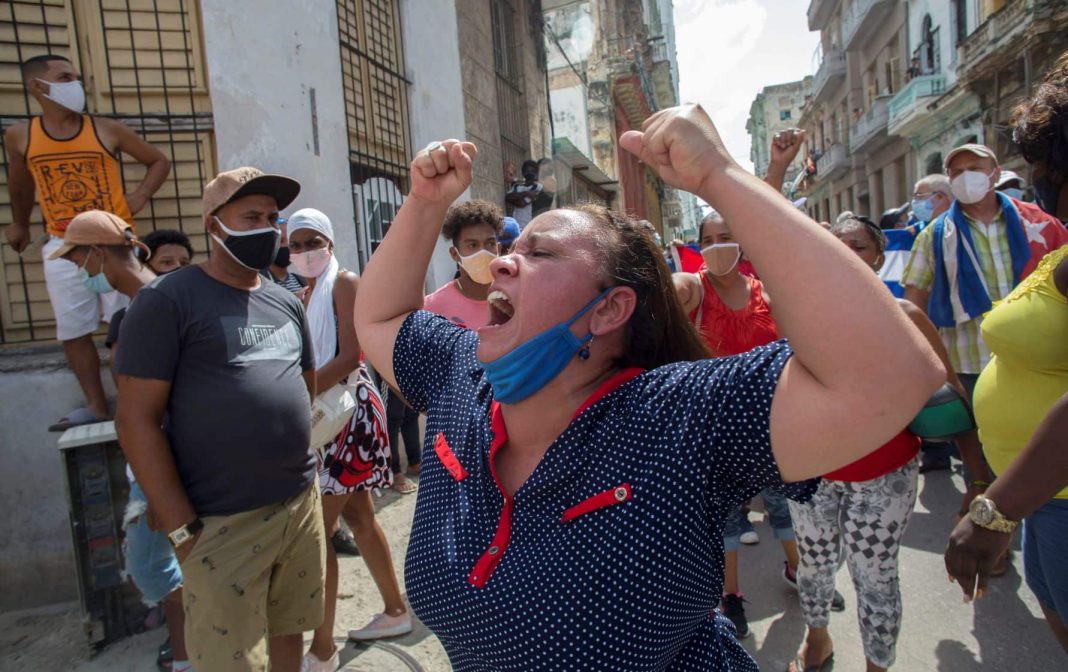Chanting “freedom” and calling for President Miguel Diaz-Canel to step down, thousands of Cubans have attended rallies in the biggest anti-government demonstrations on the Communist-run island in decades.
The protests erupted amid Cuba’s worst economic crisis since the fall of the Soviet Union, its old ally, and a record surge in coronavirus infections.
People are voicing anger over shortages of basic goods, curbs on civil liberties and the authorities’ handling of the pandemic.
Thousands took to the streets in various parts of Havana including the historic centre, their shouts of “Diaz-Canel step down” drowning out groups of government supporters waving the Cuban flag and chanting “Fidel.”
Special forces jeeps, with machine guns mounted on the back were seen throughout the capital and the police presence was heavy even long after most protesters had gone home by the 9pm curfew in place due to the pandemic.
Diaz-Canel, who also heads the Communist Party, blamed the unrest on old Cold War foe the United States, which in recent years tightened its decades-old trade embargo on the island, in a televised speech on Sunday afternoon.
Diaz-Canel said many protesters were sincere but manipulated by US-orchestrated social media campaigns and “mercenaries” on the ground, and warned that further “provocations” would not be tolerated.
Reuters witnesses in Havana protests saw security forces, aided by suspected plain clothes officers, arrest about two dozen protesters. Police used pepper spray and hit some protesters as well as a news photographer.
In one area of Havana, protesters took out their anger on an empty police car, rolling it over and then throwing stones at it. Elsewhere, they chanted “repressors” at riot police.
The Caribbean island nation of 11 million inhabitants has seen a growing number of protests over the past year.
On Sunday video on social media showed hundreds of residents chanting anti-government slogans and demanding everything from coronavirus vaccines to an end of daily blackouts.
There were protests later on Sunday hundreds of kilometres to the east in Palma Soriano, Santiago de Cuba, where social media video showed hundreds marching through the streets.
“They are protesting the crisis, that there is no food or medicine, that you have to buy everything at the foreign currency stores, and on and on the list goes,” resident Claudia Perez, said.
Cuba has been experiencing a worsening economic crisis for two years, which the government blames mainly on US sanctions and the pandemic, while its detractors cite incompetence and a Soviet-style one-party system.
A combination of sanctions, inefficiencies and the pandemic has shut down tourism and slowed other foreign revenue flows in a country dependent on them to import the bulk of its food, fuel and inputs for agriculture and manufacturing.
The economy contracted 10.9 per cent last year, and 2 per cent through June of 2021. The resulting cash crunch has spawned shortages that have forced Cubans to queue for hours for basic goods throughout the pandemic.
Cuba has begun a mass vaccination campaign, with 1.7 million of its 11.2 million residents vaccinated to date and twice that many have received at least one shot in the three-shot process.
Still, the arrival of the Delta variant has prompted cases to surge, with health authorities reporting a record 6923 cases and 47 deaths on Sunday – twice as many as the previous week.
AAP



